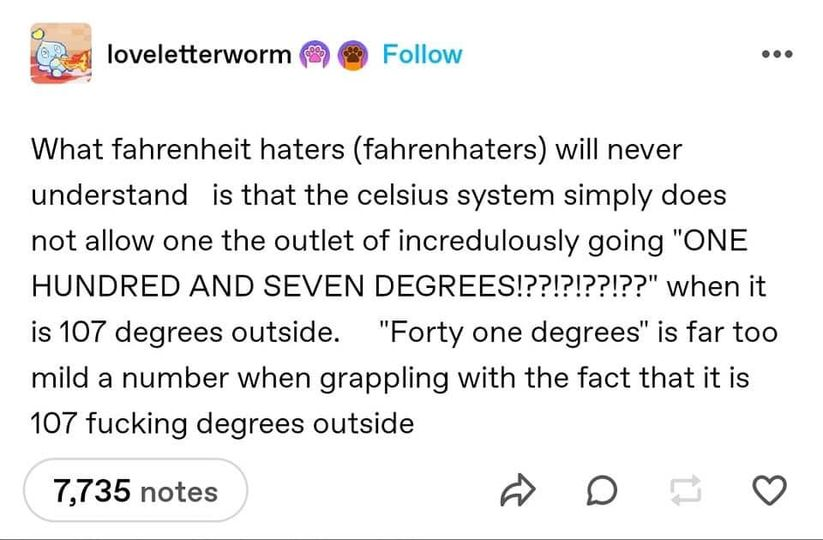this post was submitted on 09 Sep 2024
1228 points (92.3% liked)
Science Memes
10309 readers
860 users here now
Welcome to c/science_memes @ Mander.xyz!
A place for majestic STEMLORD peacocking, as well as memes about the realities of working in a lab.

Rules
- Don't throw mud. Behave like an intellectual and remember the human.
- Keep it rooted (on topic).
- No spam.
- Infographics welcome, get schooled.
Research Committee
Other Mander Communities
Science and Research
Biology and Life Sciences
- [email protected]
- [email protected]
- [email protected]
- [email protected]
- [email protected]
- [email protected]
- [email protected]
- [email protected]
- [email protected]
- [email protected]
- [email protected]
- [email protected]
- [email protected]
- [email protected]
- [email protected]
- [email protected]
- [email protected]
- [email protected]
- [email protected]
- [email protected]
- [email protected]
- [email protected]
- [email protected]
- [email protected]
- !reptiles and [email protected]
Physical Sciences
- [email protected]
- [email protected]
- [email protected]
- [email protected]
- [email protected]
- [email protected]
- [email protected]
- [email protected]
- [email protected]
Humanities and Social Sciences
Practical and Applied Sciences
- !exercise-and [email protected]
- [email protected]
- !self [email protected]
- [email protected]
- [email protected]
- [email protected]
Memes
Miscellaneous
founded 2 years ago
MODERATORS
you are viewing a single comment's thread
view the rest of the comments
view the rest of the comments

that's an interesting idea, BUT, the boiling point for water also exists under f as well, it's just 212 f, which if you want to round for convenience, is 200f. 100f is just about half the boiling point of water.
I guess you celsius folks might be more water pilled than the average US citizen, but it's not like it's impossible.
Your scale in water terms starts at 32. 100 is nowhere near halfway between 32 and 212
the celsius scale literally covers 55% of the range of the fahrenheit scale. I'd say "about half" is perfectly reasonable.
granted, it skews since you're starting on the low end. The figure is more like 122f right in the middle, which is, not great, but i wasn't going to calculate the half boiling point as i've literally never seen it be relevant anywhere lol.
Celcius degrees are quite a bit larger than Fahrenheit degrees. 0 to 100C is much larger than 0 to 100F so I don't get what you mean by Celcius covering about half of Fahrenheit. In any case neither scale runs out of numbers high or low
my main point was that accuracy matters a lot less with fahrenheit, because it's so much broader. a range of about 10 degrees fahrenheit is the average subjectively experienced "change" in temperature, at least on the higher end, where there's more difference between the individual numbers. On the cold side there's a lot less variance as it meets at about -40 in both systems.
this is very true though, hard to run out of numbers when you can just make more up, although there is an ultimate limit in either direction, due to what temperature actually measures. That's a physics thing though.
The words you are looking for are that Fahrenheit is more precise. But it's not as there are an infinity of numbers between any two integers.
My thermometer at work which I use for health and safety stuff reports temperature to two decimal places. Had we wanted more precision we could have gone with twenty decimal places. In too big or too small metric units we use multipliers - metres are too small for long distances so we use kilometres (thousands of metres), metres are too big for construction so we use millimetres (thousandths of metres)
Where Celcius degrees are too big, people (scientists, since whole degrees or a single decimal is enough for everyone else) use milikelvins
yeah and you could make a temperature scale call it fuckwit and make water freeze at -1, and water room temperature at 0, and then make it boil at 1. I don't know why you would want to do that though.
well you wouldn't go with twenty decimal spaces because after you get past about 4 decimals, it starts to become inconsequential, and you should really just use sci no anyway.
fascinating that you propose this, because this is literally the opposite of what i said lol.